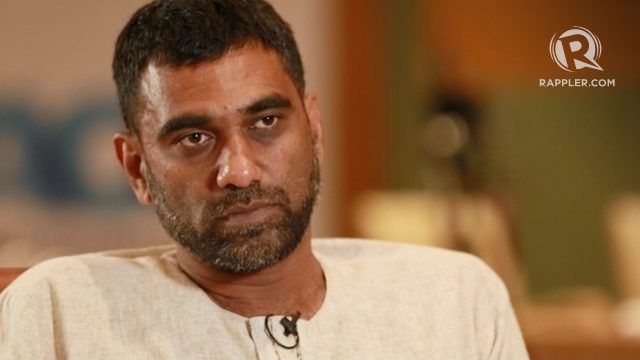SUMMARY
This is AI generated summarization, which may have errors. For context, always refer to the full article.

PUTRAJAYA, Malaysia – “For Southeast Asia’s political leadership, they have to pull up their socks if they do not want to be dismissed when they get to Paris.”
The head of Greenpeace International urged governments of disaster-prone Southeast Asia to show bolder leadership in cutting greenhouse gas emissions and setting energy policy ahead of crucial Paris climate talks in December.
South Africa’s Kumi Naidoo told Rappler that the region’s leaders must match their rhetoric on the typhoons and extreme weather events that hit their countries with actions to mitigate the effects of climate change.
“The Southeast Asian political leadership has not grasped the seriousness of the situation they find themselves in. If we do not get a successful outcome in Paris and have zero deforestation as a reality, sadly, what we’ve witnessed even with Typhoon Haiyan will look like a Sunday morning picnic 20 to 30 years from now,” Naidoo said in an interview here at the sidelines of the 16th International Anti-Corruption Conference.
The Greenpeace chief was referring to the monster typhoon that hit the Philippines in 2013, the world’s strongest cyclone to hit land. It killed over 6,000, and left thousands homeless.
Countries have until October 1 to submit to the United Nations a list of actions they will take to address climate change like reducing carbon emissions, and building resilience.
Greenpeace Southeast Asia recently said that Indonesia will not achieve its targets for as long as the government continues to allow the current pace of deforestation, and relies heavily on coal. Indonesia has one of the world’s highest deforestation rates, with land cleared for palm oil plantations and other farms.
The Philippines, the third most disaster-prone country in the world, has yet to submit its plan but also faces criticism about its coal plants.
Naidoo said that Southeast Asian leaders cannot cite economic development as a justification for inaction. He stressed that “there is no such thing as clean coal, only less dirty coal.”
“The real stupidity is that for short-term profit, you are actually putting in the Philippines entire islands at risk. I remember watching [the city of] Tacloban in the news,” he said. “What does it take for our leaders to move beyond the rhetoric of how concerned they are to going to Paris with a strong call to fellow leaders, especially those from developed countries?”
Beyond governments, civil society must also step up. Naidoo said that Greenpeace and other NGOs are exploring climate litigation for vulnerable countries like the Philippines, and the island nation of Kiribati which faces rising sea levels.
“We are going after big oil, coal, and gas companies. We will start litigation that see whether those that created the problem are held financially accountable for the reconstruction of places like Tacloban where there is such severe loss and damage.”
Naidoo was an anti-apartheid activist in South Africa now fighting climate change and environmental degradation.
“It cannot be business as usual, and on our side, it cannot be activism as usual either.”
China’s renewables and the US Congress
While developing nations must act, Naidoo pointed out that the United States and China have key roles to play as the world’s top polluters. Together, they account for over a third of global greenhouse gas emissions.
He commended the steps the two superpowers took in the past year like investing in renewable energy and announcing cuts in carbon emissions, but stressed that these are not enough.
“China even turned climate change into a money [source] because 90% of solar panels installed in Europe came from China. I’d rather see those panels installed in China itself, and Europe gets its own panels. But the fact that the Chinese communists said we will get emissions to peak by 2030 is extremely, extremely positive.”
As for the US, Naidoo said President Barack Obama’s pronouncements and recent visit to the Arctic to highlight the need for climate action are also inadequate. He added that while Obama is sincere, a Congress dominated by members tied to “big corporate interests” undermines his efforts.
“Hopefully, President Obama convinces the Republicans in Congress that they need to change, and hopefully if he cannot, when the Pope addresses the joint houses in September, maybe that will make the seismic change.”
The Greenpeace head said that Pope Francis, the Dalai Lama, and Muslim leaders lent significant moral authority to the climate justice movement.
‘Legal corruption causes disinformation’
A speaker at the anti-corruption conference, Naidoo drew the link between corruption and misinformation on climate change.
He said that the fossil fuel industry compromises the environment by lobbying and controlling the mainstream media.
“They did everything in their power to contaminate the public conversation, to create confusion. They bought out scientists, and increasingly these stories are coming out of the media of scientists who sound very respectable but are actually paid by oil and gas companies,” Naidoo said.
Still, environmentalists already won the debate. The challenge now is to get political leaders to make bold commitments, and follow through with the Paris deal.
A speaker at the anti-corruption summit, Naidoo delivered a powerful message for activists, businessmen and government leaders.
“Not acting against climate change would be the biggest act of corruption. The biggest theft of all is stealing our children’s future.” – Rappler.com
Rappler multimedia reporter Ayee Macaraig was chosen to be part of the Young Journalists Initiative of the IACC. She is in Malaysia to cover the anti-corruption conference of Transparency International.
Add a comment
How does this make you feel?
There are no comments yet. Add your comment to start the conversation.